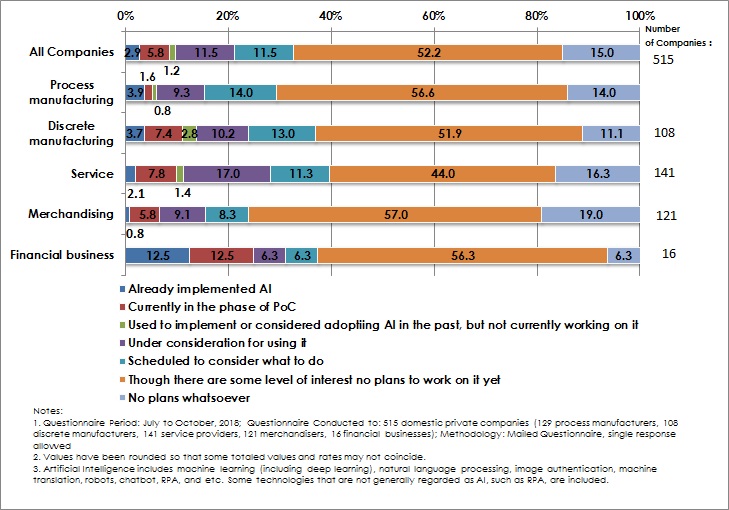No.2040
Only 2.9% Implemented AI in 515 Domestic Private Companies with Merchandising Industry Recording Lowest Rate at 0.8%
AI Implementation Status in Private Companies in Japan: Key Research Findings 2018
Yano Research Institute (the President, Takashi Mizukoshi) has conducted a corporate questionnaire to 515 domestic private companies and has found out the implementation status of Artificial Intelligence technologies (machine learning, deep learning, natural language processing, image authentication, machine translations, robots, chatbot, RPA, and etc.) and the trend by industry.

Summary of Research Findings
A corporate questionnaire was carried out to 515 domestic private companies in the period between July and October 2018 regarding the status of implementing AI (Artificial Intelligence) technologies. Out of 515 domestic private companies, the rate of those that responded “Already Implemented AI” accounted for 2.9% of the entire responses at that point. Although AI has attracted attention, the rate of implementation of the technologies was limited.
Next, the response of “Currently in the phase of PoC” accounted for 5.8%, which makes 8.7% when adding the response rate of “Already implemented.” On the other hand, only 15.0% of the companies responded “No plans whatsoever,” showing keen interest to AI.
When looking at AI implementation rate by industry, financial businesses (n=16) achieved the largest with 12.5%, followed by process manufacturing (n=129) accounted for 3.9%, discrete manufacturing (n=108) 3.7%, service providers (n=141) 2.1%, and the lowest was merchandising (n=121) with 0.8%. It shows that manufacturing industry has relatively high implementation rate than the rate by the entire companies.
Noteworthy Topics
Many companies in merchandising have a tendency of being excessively careful in using information technologies, and therefore tend to be short on number of IT staff. This tendency has been shown in this research as well, recording the lowest AI implementation rate among all the industries.
However, in recent years, the environment surrounding merchandising has been changing dramatically. With labor shortage stemming from falling birth rate and aging population becoming more serious, the industry faces imminent challenges to solve, such as difficulty in adopting new store staff, aging existing store staff bringing about increasing retirement.
In order to cope with such problems in merchandising, some AI-implemented solutions have been provided to support various operations including payment, sales, forecasting demand, and etc., which is expected to be highly effective in labor saving and automated operations. On the other hand, however, use of AI in merchandising industry has been taken place only at large companies. In order for midsize and small companies to accept AI, lower cost of AI solutions is needed, and so is obvious verification of implementation effects.
Research Outline
2.Research Object: Domestic private companies
3.Research Methogology: Mailed questionnaire requiring company names
What is Artificial Intelligence?
AI, or artificial intelligence, in this survey indicates the following technologies: Machine learning (including deep learning), natural language processing, image authentication, machine translations, robots, chatbot, RPA (Robotic Process Automation), and etc. Some technologies that are not generally regarded as AI, such as RPA, are included.
Published Report
Contact Us
The copyright and all other rights pertaining to this report belong to Yano Research Institute.
Please contact our PR team when quoting the report contents for the purpose other than media coverage.
Depending on the purpose of using our report, we may ask you to present your sentences for confirmation beforehand.